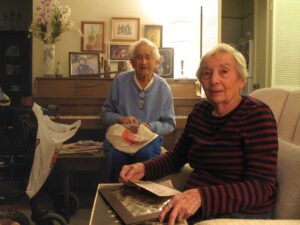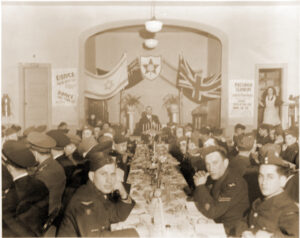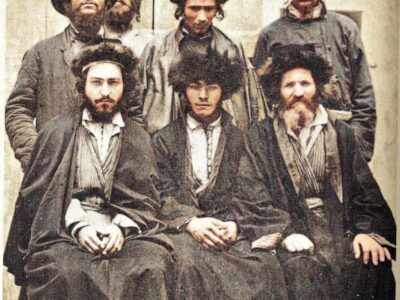From the Beth Sholom Bulletin, 2016
 Harry Musicar and Selma Musicar attended High Holidays services as usual this year at Beth Sholom as they have annually for most of the last six decades.
Harry Musicar and Selma Musicar attended High Holidays services as usual this year at Beth Sholom as they have annually for most of the last six decades.
Harry and Selma have been members of Beth Sholom for nearly 60 years, but their association with the shul’s founding rabbi, David Monson, goes back even further. He married them about nine or ten years earlier in a ceremony at the Henry Street Synagogue, former home of B’nai Jacob Congregation in downtown Toronto.
That was in 1947, just a couple of years after Harry left the armed services and resumed his studies as a pharmacist. Selma had been working as a stenographer. Both had been born in Toronto, Harry in 1920 and Selma in 1925.
“Monson had just come out of uniform when he married us,” Selma recalled during an interview in their midtown apartment in early November [2016].
We sat in the living room, near a piano crowded with family photographs. Other musical associations were evident in the paintings on the wall and the music stand beside the piano that held some sheet music for clarinet. “My father played sax and clarinet,” said Harry, who also plays the clarinet.
The family has been involved with music for generations, so much so that they took the surname Musicar a few generations back in the Minsk region of Russia (now Belarus). Harry’s father, Sam, fixed sewing machines, sold insurance, and played music in a band. A piece on the music stand with the byline Sam Musicar reveals he was a composer as well.
Harry continued this family tradition from an early age. The family lived on Palmerston Avenue below Dundas and belonged to the Londoner Shul, home of the Hebrew Men of England Congregation, on Spadina Avenue across from the Labour Lyceum. “I had my bar mitzvah there, and when I got off the bima the chazzan — his name was Bornstein — grabbed me and said, ‘Listen, you sound so good I want you to sing in my choir.’”
Harry joined the choir and was assigned the part of an alto despite his protests that he was a soprano. Eventually Chazzan Bornstein agreed to test his voice. “He had an apartment on Palmerston Avenue just north of Dundas; I lived below Dundas. I went up to his place and he was tinkling on the piano and he had company. And he said, ‘Okay, I’m going to check your voice.’ So I sang God Save the King for him and he said, ‘You know what? You’re a soprano.’” But choir practice ended so late some evenings — sometimes after midnight — that his mother said he couldn’t go any more.
Growing up on Palmerston, Harry was also familiar with the Palmerston Shul. “When I was a youngster, the thing that used to fascinate me was that the boys used to daven in the morning in the basement, and I could look in the window. When they finished davening, they used to pour a glass of schnapps about that big and just toss it down. You’d never know they had a drink. They could sure handle their liquor.”
 After the outbreak of the war, Harry volunteered for the air force and was stationed in Dartmouth, Halifax where he played in an air force band for the duration. During this period, he saw a sign in the window of a Halifax drugstore: ‘Pharmacist wanted, no Jews need apply.’
After the outbreak of the war, Harry volunteered for the air force and was stationed in Dartmouth, Halifax where he played in an air force band for the duration. During this period, he saw a sign in the window of a Halifax drugstore: ‘Pharmacist wanted, no Jews need apply.’
Back in Toronto, he met and married Selma Goodman, whose father came from Lodz, Poland and her mother from the village of Chechersk in the Mohilev region of Russia (now Belarus). The oldest of three children, she grew up on Major Street near Bloor; her father worked as a printer.
“Oh, of course there was discrimination back then,” she said. “When I was looking for a job, they advised me to get a job with a Jewish firm.”
In the early 1950s the Musicars moved up to a house on Risa Blvd. in the Glencairn-Dufferin area where they could raise their three children. After being in the neighbourhood for a few years, Harry became reacquainted with Rabbi Monson.
“It was Yomtov and they had the big succah in the yard at Monson’s shul, in the parking lot, and he was serving wine at a counter. I came up to him and said ‘Hi, Rabbi’ but he forgot who I was. I said, ‘You married me and my wife, and you don’t remember me?’ He said, ‘Give me a few minutes’ and he walked away.
“A girl behind the counter said, ‘You better tell him who you are or he’ll go bananas.’ So I gave him a clue, and he began rhyming off everyone in the family. He knew my whole family forwards and backwards.”
The Musicars two sons were bar-mitzvahed at Beth Sholom. Some 60 years after they first joined the congregation, they are still regulars on the High Holidays and the name of Beth Sholom is still music to their ears. ♦






